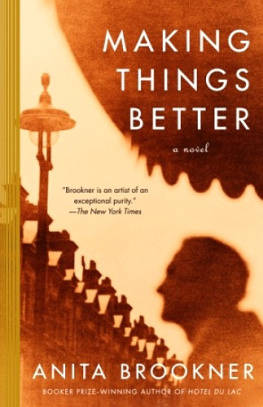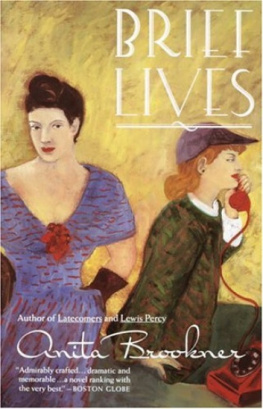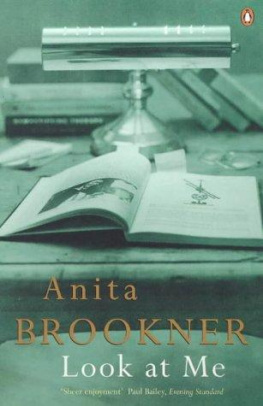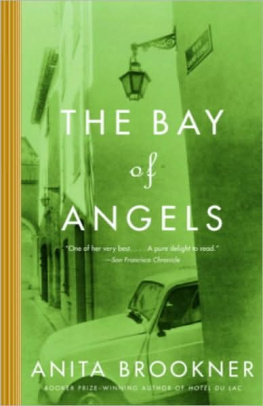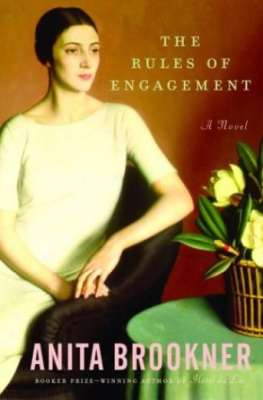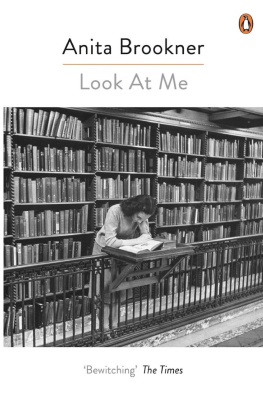Anita Brookner - Making Things Better
Here you can read online Anita Brookner - Making Things Better full text of the book (entire story) in english for free. Download pdf and epub, get meaning, cover and reviews about this ebook. year: 2004, publisher: Vintage, genre: Detective and thriller. Description of the work, (preface) as well as reviews are available. Best literature library LitArk.com created for fans of good reading and offers a wide selection of genres:
Romance novel
Science fiction
Adventure
Detective
Science
History
Home and family
Prose
Art
Politics
Computer
Non-fiction
Religion
Business
Children
Humor
Choose a favorite category and find really read worthwhile books. Enjoy immersion in the world of imagination, feel the emotions of the characters or learn something new for yourself, make an fascinating discovery.
- Book:Making Things Better
- Author:
- Publisher:Vintage
- Genre:
- Year:2004
- Rating:3 / 5
- Favourites:Add to favourites
- Your mark:
- 60
- 1
- 2
- 3
- 4
- 5
Making Things Better: summary, description and annotation
We offer to read an annotation, description, summary or preface (depends on what the author of the book "Making Things Better" wrote himself). If you haven't found the necessary information about the book — write in the comments, we will try to find it.
Making Things Better — read online for free the complete book (whole text) full work
Below is the text of the book, divided by pages. System saving the place of the last page read, allows you to conveniently read the book "Making Things Better" online for free, without having to search again every time where you left off. Put a bookmark, and you can go to the page where you finished reading at any time.
Font size:
Interval:
Bookmark:
Making Things Better
Anita Brookner
Herz had a dream which, when he awoke into a night that was still black, left him excited and impressed. He dreamed that he had received a call from his cousin, Fanny Bauer, the love of his life. He was to take her to the cinema, she ordained. Eager to conform to her wishes, as he always had been, he shrugged on his coat, and within seconds was elsewhere, as was the norm in dreams of wish-fulfilment. Although it was a weekday afternoon the cinema was so crowded that they had to stand at the back of the auditorium. Fanny was as he had always known her and still remembered her: petulant, with the petulance of a spoilt pretty woman, demanding and discontented. Shortly after the beginning of the film she had clutched his arm and declared that she felt unwell. Again, without transition, they found themselves in the vast caf that was part of the cinema complex. Fanny had recovered somewhat but looked uncharacteristically dishevelled, with a large camel-hair coat slung over her shoulders. He was conscious of retaining his eager smile, but felt discomfited. This feeling had something to do with the coat, which he recognized as his own, the coat he should have been wearing. He had no memory of having offered it to her. The coat, and Fanny's malaise, remained closely associated in his mind. It was only when he understood that it was he who had been taken ill that the dream attained its peak of significance. Ailing, smiling, he had offered her his remaining health and strength, and she, not in the least grateful, had carelessly dispossessed him, not noticing that she had done so. This was so akin to their real life association that, if anything, his newly awakened self was conscious of its reality. Brought back to himself he was aware of the smile of complicity, of acquiescence directed to the corners of the dark bedroom. Only the relentless ticking of his clock informed him that he had woken up, that this would soon be a new day, all too closely resembling the others, the normal days of his present existence, in which nothing happened nor could be expected to happen.
He had not seen her for thirty years. In the dream they were both young and she was still unmarried, before Nyon, before Mellerio, before his own family had come to England. It was his longing that had made him feel close to her, since he thought about her so often and so much that there seemed to be no distance between them. This longing extended to her parents, whom he preferred to his own. He knew that his own parents were socially inferior, although he suspected that morally they had the upper hand. His mother had never forgiven her sister for marrying out, though by no means observant in her own right. His father, a modest man, deferred to his brother-in-law without ever feeling entirely comfortable in his presence. Yet it was this brother-in-law, Hubertus, who had guaranteed them safe passage out of Berlin. Their house, one of those chic villas that Hubertus was so good at constructing, had all the charm of a more carefree establishment, an hotel, for example, or some kind of resort. By the same token, his aunt, Anna, appeared always on the verge of giving a party. They played bridge, drank cocktails, yet even at his young age he could see that they were merely fashionable, slightly meretricious. He did not know then that they were worried about the fate of their ardent dark-eyed daughter, whose looks were so suspect in the Germany of that time. His own parents were worried, morbidly worried, not about their own fate, but for that of their elder son, Freddy, their musical genius, rather than that of the eagerly smiling Julius. This had brought the two families momentarily closer; there were more telephone conversations than had previously been the case. Hubertus would stay behind; that was never in any doubt. But it would be prudent for his wife and daughter to be moved elsewhere, out of harm's way. Herz's own father, an employee in a firm that made musical instruments, had every faith in his colleagues, in his director, to whom he had pledged his loyalty. How could such loyalty not be recognized, and if necessary protected? His mother, who was afraid of everything, dreamed of escape from the many difficulties with which life had presented her. She, rather than her husband, put her diminishing faith in Hubertus; he rather than her too humble partner would know what to do.
As the boy, Julius, presented himself at his aunt's tea-table, his smile making up for his lack of an invitation (he would overlook this though they might not), he was given the sort of greeting into which he read so much: familiar, if slightly impatient. He had just missed Fanny, he would be told; she was playing tennis with friends, with some of her set , but he would stay for a quick cup of tea, his aunt queried, with a lift of her pencilled eyebrow? Useless to wait for Fanny, who would be spending the evening with her friends. The family well? This question was a pure formality, the kind in which she normally dealt. He would sit humbly in their glass and chrome drawing-room, with its pale wood and white curtains, comparing its discomfort favourably with his parents' flat, all suffuse and dim, the furnishings still those of his grandparents who had ruled their loyal daughter and meek son-in-law not entirely mercifully, and from whom Anna, the disloyal daughter, had parted with few backward glances. Her marriage to a Protestant was considered an act so terrible that she was never to be forgiven, although Hubertus was a good man whose discreet allowance had ensured a comfortable old age for the tyrannical elders who continued to vilify him. It was probably a matter of survival to agree with them on this. Nevertheless the moral discomfort that this brought about made Hubertus and Anna seem an enlightened pair, as perhaps they were, and their house a haven of modernity, for which he craved. Even if Fanny were not at home and she so rarely was he could sense her presence, picture her picking up her tennis racquet, follow her in sympathy as she issued into the bright afternoon. The image was so gratifying that he would count his unscheduled visit a success, taking home impressions to be added to his meagre store, and already looking forward to another similar afternoon, when surely one day, she would be at home and delighted to see him.
Fanny Bauer! In the dream she had been young, pretty, a heart-breaker, her fickle behaviour part of her charm. In the dream his own age was indeterminate, but he recognized the smile, which in fact had never left him. When he finally reconciled himself to a day like any other he knew, without a shadow of a doubt, that he was seventy-three years old, retired , as they said of old people with too little to do, and that Fanny would be a year older. In fact when he had last seen her, in Nyon, at the Beau Rivage, she was already altered. He had sought her out after his divorce, with the intention of asking her to marry him. He had found a stout dignified woman who did not even possess her mother's chic. Julius! she had said. What on earth are you doing here? And he had made his request, far too early in the proceedings, without the proper setting or preparation, to have it waved away by a still pretty hand. He did not tell her that he had followed her progress by dint of some unnecessary detective work, for what was there to discover? He already knew that Fanny and her mother had, by virtue of Hubertus's prudence, been dispatched to Switzerland, to the most peaceful and neutral of lakeside towns, until things improved. He knew that equally prudent Aunt Anna had found her daughter a husband, an architect called Mellerio who had taken them both on, installing them in his ugly villa, from which they escaped as often as they could, to eat cakes at the English tea-room or to sit on the terrace of the Beau Rivage, to which they quite naturally retired after Mellerio's death from a fall when he was inspecting one of his own buildings. The sale of his house and of his business had left them well off: the hotel suited them, or rather hotel life suited them, was appropriate to a deracinated existence which could surely be only temporary. They were safe, more than safe, for the time being, but in fact never went home, for home no longer existed, flattened by Allied bombs, and Hubertus no longer alive to make plans for them all.
Next pageFont size:
Interval:
Bookmark:
Similar books «Making Things Better»
Look at similar books to Making Things Better. We have selected literature similar in name and meaning in the hope of providing readers with more options to find new, interesting, not yet read works.
Discussion, reviews of the book Making Things Better and just readers' own opinions. Leave your comments, write what you think about the work, its meaning or the main characters. Specify what exactly you liked and what you didn't like, and why you think so.

